What Makes A Country Expat-Friendly?
Most people start thinking about moving abroad by asking the wrong kind of question. They ask which country is best for expats, as if there’s some...
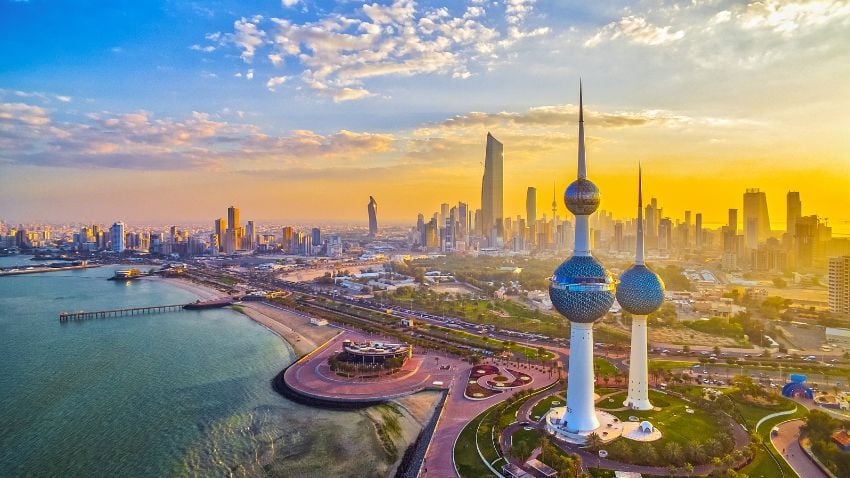
8 min read
Central Banks are always obscure institutions that create money out of thin air and have the power to make countries poorer overnight. These last two years, governments have restricted many fundamental liberties but justified them for the “greater good.” Thanks to subsidies, the most fortunate employees could get their paycheck or at least a fraction of it. That is the laugh-now-cry-later solution… Now the regular citizen is experiencing rampant inflation in essential goods such as food, energy, oil, and housing. Some examples are electricity in Spain, reaching an average daily price of 0.50 €/KwH (about $0.50 USD/KwH), and US fuel prices going for almost 5 dollars a gallon.
The informed, often categorized as “conspiracy theorists,” are aware that this is part of the Great Reset. Its basic premise is “you will own nothing and will be happy.” Despite how unhopeful this situation may be, methods exist to protect and multiply your wealth even in critical times. In Expat Money, we pride ourselves on sharing with you the most accurate legal and financial information so that you can secure your new life abroad. We will discuss the top 5 currencies with the lowest inflation, the most stability, and steady momentum. And none of them are the Euro or the Dollar.
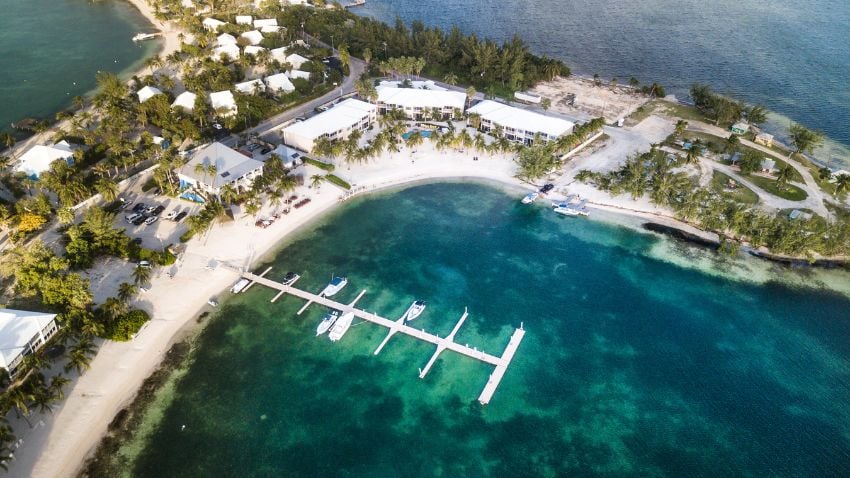
Grand Cayman, Cayman Islands
The Cayman Islands is a British overseas territory often regarded as a “tax haven.” In reality, this offshore jurisdiction enjoys outstanding economic stability and is a place where many corporate, sales and income taxes (among others) do not apply. Some corporations, like Air Canada or Bank of America, operate here. These days, 1 Caymanian Dollar (KYD) equals $1,21 USD. Until 1972, the Islands’ official currency was the Jamaican Dollar.
The main economic driver is the services sector, especially banking, insurance, and offshore management, representing around 86% of GDP. Agriculture and industry are also important but not that significant compared to tourism. According to Lloyd’s Bank, the country holds 85% of the world’s hedge funds and more than 11,000 mutual funds. However, the territory has been going through some inflation episodes this year, according to the Economics and Statistics Office of the Islands. For example, in March 2022, it reached 11.2%. The leading causes of yearly inflation are higher fuel and energy costs.
According to the World Bank, citizens benefit from a standard of living comparable to Switzerland, and the per capita income is over $85,000 USD. Unemployment is barely 5%, and social stability helps the territory progress steadily. Despite current inflationary events, investing in the country might be a good option for high-net-worth individuals as the financial sector is highly developed and professional.
Related content: The Many Residency By Investment Options In The Cayman Islands
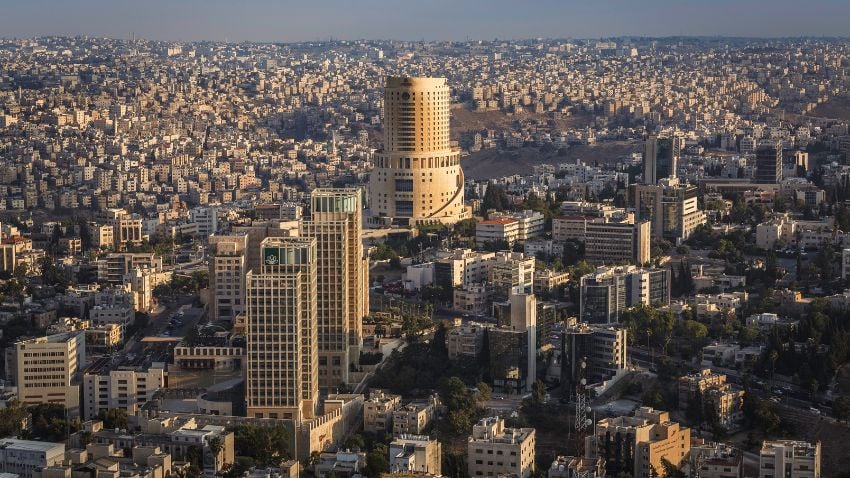
Capital of Jordan, Amman
Despite not having a wealthy economy, 1 Jordanian Dinar (JOD) equals $1.41 USD, mainly because it is pegged to the USD. That gives the country’s currency more stability. Therefore, the government restricts the value of the JOD, and the value does not broadly fluctuate. In other words, the national currency might keep its strength despite the weaknesses of its economy. Unlike many countries in the region, Jordan does not possess vast oil and gas reserves but rather minerals such as copper, salt, uranium, or shale oil.
The economy is diversified but not that prosperous. The main economic drivers are trade and finance, roughly a third of GDP; transportation and communication, construction and public utilities, a fifth of GDP; and mining and manufacturing, a fifth of GDP. Remittances from expatriate Jordanians are also crucial. The country has significant government spending, and one-third of the workforce belongs to the public sector. Although the currency is strong in terms of Foreign Exchange, most Jordanians cannot keep up with the high cost of living, and, to make matters worse, conflicts in the neighbouring countries make the situation more complex. At some points in recent years, inflation reached high rates: for instance, in 1999, hitting over 24%, and in 2018, hitting over 12%. For some years, the country experienced negative inflation too. See the graph here. Compared to other countries in the region, Jordan has little inflation. Here’s an article to get further context.
The economy is stagnant, the public sector is inefficient, unemployment is on average above 15%, and the region's political instability does not help Jordan deal comfortably with its circumstances. Perhaps this currency value will not last very long due to all the previous reasons, so it might be better to invest elsewhere in the region.
Related content: The Basics Of How To Get A Second Passport Or A Second Residency.
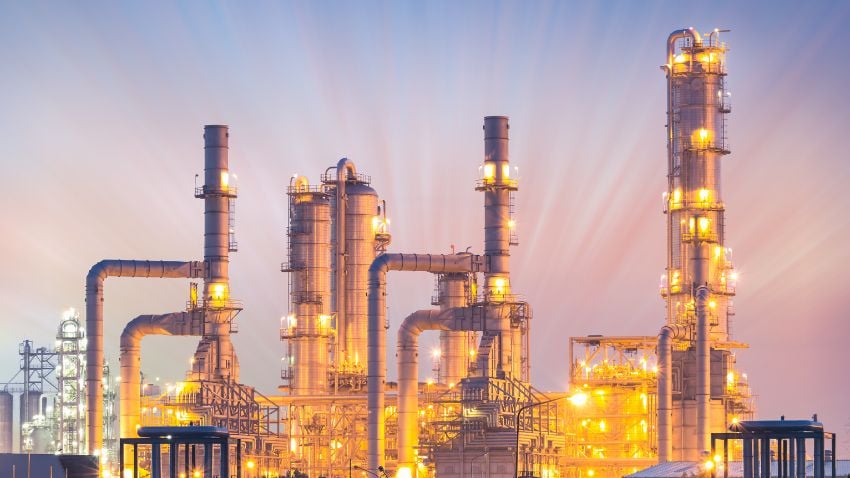
Oil refineries are one of the investments available for you in Oman.
Like the following two countries, the Sultanate of Oman is a former British protectorate and oil-reliant economy profiting from the current state of the market. 1 Omani Rial (OMR) equals $2.60 USD. In the past, the Omani Rial experienced some episodes of high inflation, such as in 2008, when it reached 12.38%, mainly due to an increase in food prices, rents, and public spending. But apart from those exceptions, this currency has enjoyed stability and even some years of slightly negative inflation. So far, this year’s inflation is 3.74% which is much better than in other countries.
In this case, Oman’s diversification strategy has its due date in 2040. According to the official Oman 2040 vision document, the country expects to improve its economy in the sectors of technology, tourism, education, and manufacturing, as well as maintain high standards in the oil and gas industry. Despite the prosperity, the country has significant debt accounting for over 80% of GDP and a large budget deficit of 8% in 2021. However, the government published a medium-term fiscal plan to fight against these deficits. Some measures include introducing a 5% VAT, taxing high-income earners, excising taxes on products such as tobacco or pork, and supporting investment and economic growth. By the start of 2022, the country’s inflation rate was 4.4%, whereas now it is 2.4%.
In the cases above, if oil stays up, it might be a good idea to protect wealth in this currency and even invest in the country despite its current public debt. In 2022 though, the country experienced budget surpluses thanks to oil revenue.
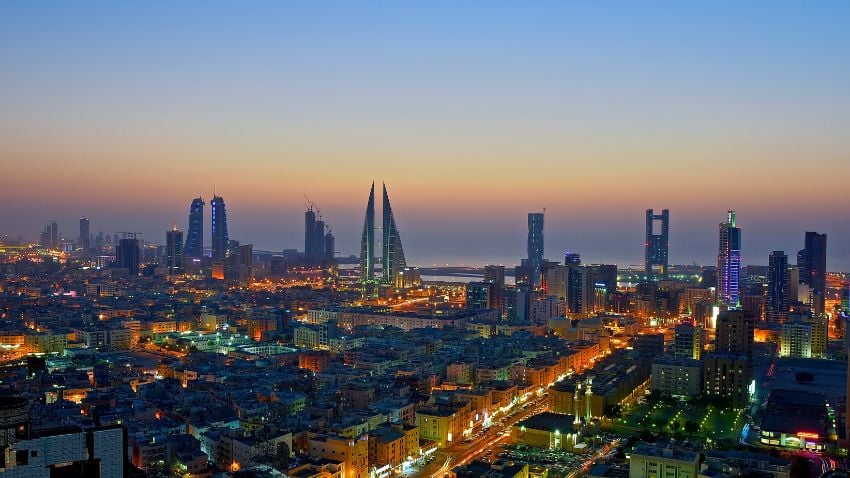
Manama, Bahrain
Another Gulf currency makes it to the list. 1 Bahraini dinar (BHD) equals $2.65 USD as of the time of writing. The Kingdom of Bahrain is a former British protectorate that gained independence in 1971.
These days the country enjoys a wealthy economy with a strong dependence on the gas and oil industry, representing 85% of the government's budget. But that is not the only notable industry, as financial services account for 17.7% of GDP, according to the Central Bank of Bahrain (CBB). In 2021, Bahrain had negative inflation of -0.6%, and in 2020, -2.3%. According to the Ministry of Finance and National Economy, this was caused by lockdown measures that made the tourism sector register a record negative CPI of -38% during the second quarter of 2020, whereas food increased by 5.2%. Although the country suffered from high inflation rates from 1971 to 1982, its inflation rate has been reasonable since. For more information, check the World Bank chart. In 2022, inflation reached 3.9%, primarily due to food price increases.
Despite the BHD stability and the oil market circumstances, the country’s debt represents over 100% of GDP, and last year the budget deficit reached 10%. For now, Bahrain still offers a very tax and business-friendly system, where income, sales, capital gains, and inheritances are not liable to tax. Corporations must pay a 46% corporate tax if they belong to the oil sector, whereas the other sectors do not pay it.
As in the case of KWD, it’s important to keep in mind that the oil market fluctuates, and so chances are the BHD will also fluctuate in the future. Nevertheless, the country enjoys stable, if not slightly negative inflation, much prosperity, almost no taxes, and an overall business-friendly environment.
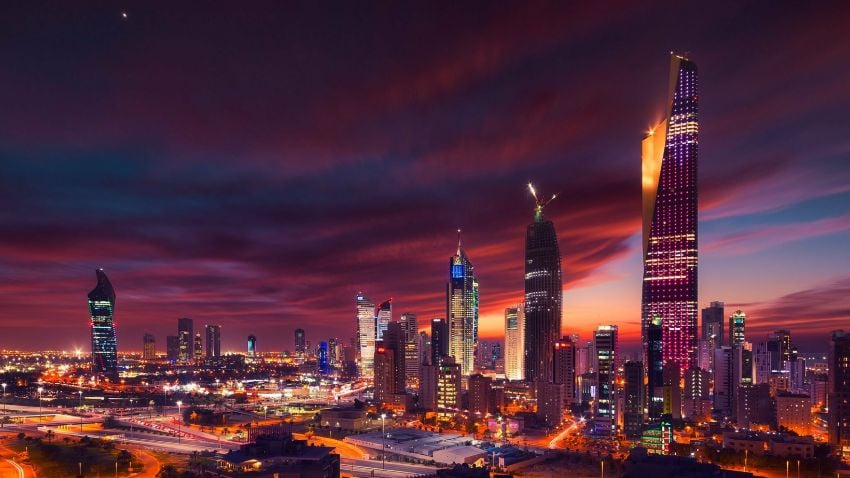
Kuwait City, Kuwait.
Yes. Three Gulf currencies made their way to the list. “Every dark cloud has a silver lining” is not a cliché but rather a truth. Even though oil prices are breaking records and negatively impacting many countries around the globe, the oil-rich nations are doing good economically. When this article was written, 1 Kuwaiti Dinar (KWD) equalled $3.24 USD (in the past, it even reached $3.55 USD), but it is pegged to other major currencies such as the GBP.
Formerly a British Protectorate, the Kingdom of Kuwait is the fifth wealthiest country on Earth in terms of gross per capita income. The national economy is based on petrol and gas (which accounts for over 50% of GDP according to the WTO), fertilizers, petrochemicals, financial services, and pearl diving. Some of its main trading partners are Japan, South Korea, China, and India. However, like many countries in the region, Kuwait has designed a plan to diversify its economy by 2035 and not be dependent only on oil. Moreover, the unemployment rate is less than 4%, and taxes are almost non-existent: individual income is tax-free, and only foreign companies and joint ventures must pay a 15% corporate tax. Other countries in the Persian Gulf experience large budget deficits, but Kuwait’s case is vastly different: the public debt is below 15% despite the generous subsidies for public sector jobs, healthcare, electricity, and education. In 2022, the inflation rate has ranged between a maximum of 0.4% in June and a minimum of 0.08% in January. See this chart here to know more.
If petrol and gas prices keep increasing, this currency will surely stay up for a long time. For now, it seems a good idea to preserve wealth in KWD, but it is crucial to keep in mind the ever-lasting oil market volatility. Fortunately, the country has a diversification plan to ensure more stability and less oil dependency.
As mentioned before, the oil market is important to keep in mind. Three Gulf currencies make the top 5 strongest currencies, but they might not hold that position forever. Therefore, it is a good idea to consider other ones that have proven their stability and reliability.
Although $1 USD equals barely 0.96 Swiss Francs (CHF) as of the time of writing, it has a brilliant reputation thanks to its stability. For instance, the European Debt Crisis of 2009-2013 caused a higher demand for Swiss Francs in the Eurozone. Like most countries, Switzerland is experiencing inflation, in this case, a maximum of 3.5% in August 2022. However, the country is an excellent investment and wealth protection jurisdiction thanks to fiscal conservatism, a strong economy, and a political system.
Related content: Residency Options For Living In Switzerland
$1 USD equals barely 0.86 GBP, but it has been a very reliable currency for years. The GBP is the main currency in international transactions, along with the Euro and the US Dollar. So far, in 2022, the currency is suffering from a 6.46% inflation rate, at the time of writing, due to more costly household services, energy, transport, and food. However, since Great Britain isn’t very libertarian-friendly, we strongly recommend you invest in other countries like the British Virgin Isles, which is also a tax haven. Other important sectors are construction and manufacturing.
Despite woke culture insulting Russia, the ruble bounced back after becoming almost worthless due to Western sanctions. Interestingly, we have witnessed Russian gas-dependent nations ban imports, and some sensationalist newspapers talk about a gas shortage that could cause an infernal winter for Europeans. Although exports dropped, the increase in commodity prices favoured Russia. On top of that, it’s also crucial to mention that Russia is instead exporting to China and India. Russia imposed strict capital controls, demanded investors to pay for energy in rubles and forced national exporters to turn half of their excess revenue into rubles. These policies increased the ruble’s value even more.
Related content: What Is Russia’s New Investment Visa Program Like?
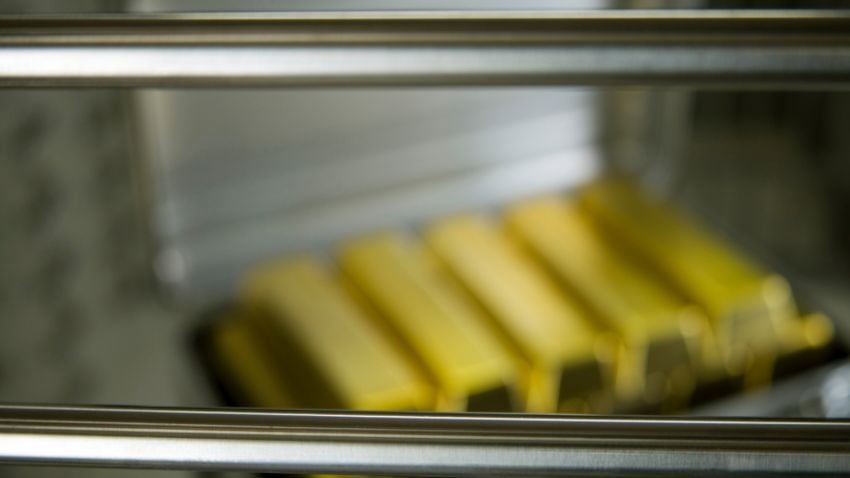
Expat Money can help you guarantee the safety of your gold with secure and profitable outcomes.
Despite not being a currency, it offers stability thanks to its scarcity and value increases in scenarios of a higher cost of living, deflation, or geopolitical uncertainty. Thanks to this protection, investors tend to have this asset in their portfolio. Moreover, while central banks issue fiat currency, gold is a tangible asset.
We have covered various currencies and explored each particular situation in their respective countries. It is important to note that preserving wealth in any of the three Gulf currencies will be a great idea if fuel prices stay up or even go higher. However, if you prefer not to depend on the oil market volatility, other currencies such as the Swiss Franc or assets like gold can provide substantial protection. At Expat Money, we will work with you to find the best unique wealth protection, investment, residency, or a combination of them for you. If you want to know more, feel free to contact us to start securing your wealth abroad.
If you want the best intel from the expat world, including profitable offshore opportunities, little-known tax-saving strategies, and hard-won insights on immigration, passports, and Plan-B residencies, all delivered to your inbox every single week, then join our daily correspondence, EMS Pulse®. Currently enjoyed by over 84,000 expats and expat-hopefuls worldwide. Fill in the form below to join our newsletter free:

Written by Mikkel Thorup
Mikkel Thorup is the world’s most sought-after expat consultant. He focuses on helping high-net-worth private clients to legally mitigate tax liabilities, obtain a second residency and citizenship, and assemble a portfolio of foreign investments including international real estate, timber plantations, agricultural land and other hard-money tangible assets. Mikkel is the Founder and CEO at Expat Money®, a private consulting firm started in 2017. He hosts the popular weekly podcast, the Expat Money Show, and wrote the definitive #1-Best Selling book Expat Secrets - How To Pay Zero Taxes, Live Overseas And Make Giant Piles Of Money, and his second book: Expats Guide On Moving To Mexico.
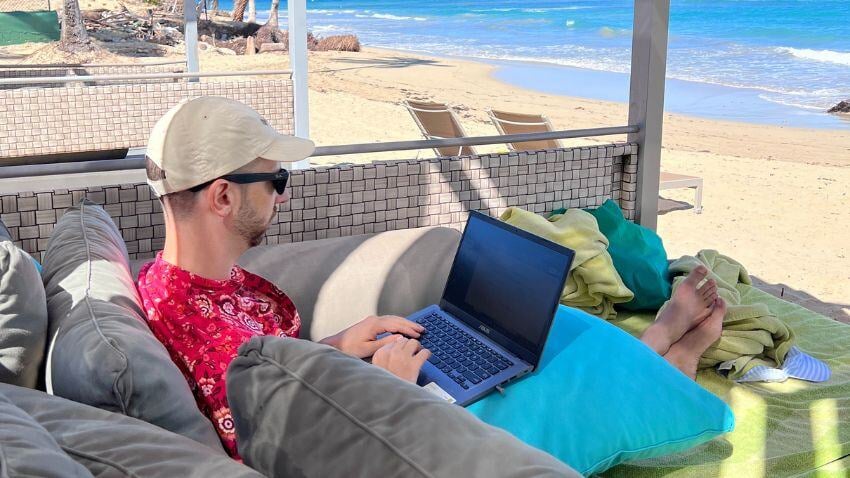
Most people start thinking about moving abroad by asking the wrong kind of question. They ask which country is best for expats, as if there’s some...

Across Latin America, people are replacing socialist governments with leaders who promise security, order, economic recovery, and a return to common...
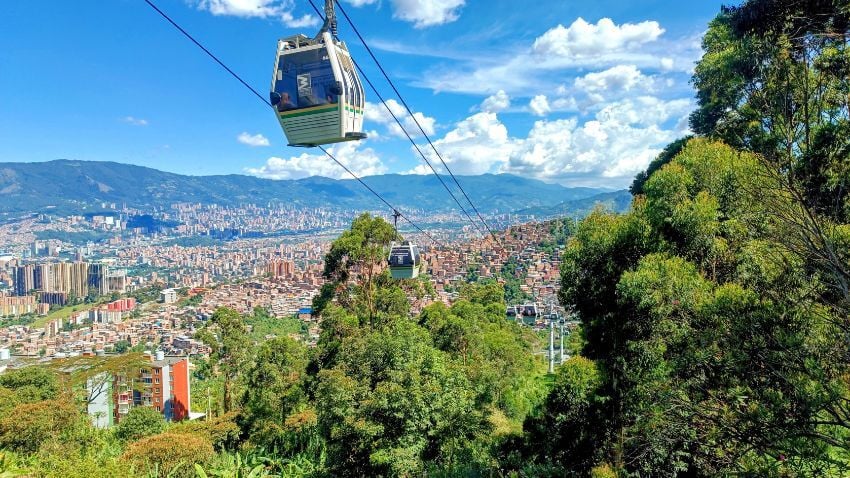
Colombia continues to move up the radar for people looking to live better, spend less, and build international optionality. With improving...